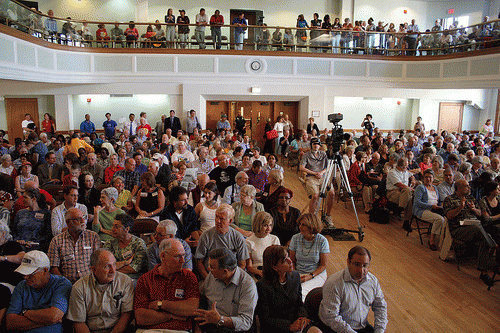Originally published in Truthout
Twenty-four US states have the ballot initiative. Unfortunately, the process is heavily skewed in favor of rich interests and unsuitable for making informed decisions. A much better method of citizen lawmaking is needed.
Problems with the ballot initiative
In a ballot initiative, citizens can put a measure (proposed law) on the ballot for a binding vote in an upcoming election by gathering a large number of petition signatures within a set time. Most successful signature drives are expensive professionally run affairs with paid signature collectors, something only the well-funded can afford. Although grassroots groups can theoretically run a volunteer signature drive, the vast majority of these fail because few can field a sufficiently large, determined and reliable army of volunteer signature collectors. The signature requirement is for these reasons more a matter of rule by dollars than rule by the people.
If a measure gets on the ballot, running an effective initiative vote campaign can be very costly. For example, in California, over $50 million has sometimes been spent supporting or opposing a ballot measure, on top of the $1 million to $3 million that may have been spent meeting the signature requirement. Billionaires and large corporations can afford to spend what is needed; modestly funded public interest groups cannot. Rich interests that face opponents of moderate means can use their wealth to ensure their side of the story is heard far more than the other. In the initiative, democracy is, to a large extent, displaced by the power of money.
Initiative voters tend to be poorly informed about the measures they vote on. This is largely because they only learn about them voluntarily in their spare time, and their attention is diffused across the various items on the ballot. The problem can be especially bad for measures that attract little public interest, involve things that are not easily and readily understood and when one side greatly outspends the other.
Legislative juries and informed rule by the people
Classical Athens, often called the birthplace of democracy, sheds light on how citizen lawmaking can be done in an informed, fair and highly democratic way. In Athens, much of the decision-making was done by various juries chosen from the citizens by lottery. This kept a wide range of decisions in the hands of the citizens, prevented elite rule and provided a more informed version of citizen rule than popular vote. Jurors were paid so that all citizens could afford to serve. In the 4th century BCE, laws were passed by the majority vote of legislative juries made up of hundreds of legislative jurors (nomothetai).
More or less following Athens' example, juries chosen from the public by random selection can meet to make informed decisions by majority vote. Jurors can be paid to work full-time for as many days or weeks as needed. As representative cross-sections of the public who are engaged to take the time to make an informed decision, randomly sampled juries provide the democratic ideal of informed rule by the people.
Instead of using the initiative's signature requirement to "qualify" a measure for the ballot, the vote of a jury at a preliminary hearing can be used. Perhaps once every two years, new juries can hold preliminary hearings for all the measures citizens bring forward. After the preliminary hearing for each measure, the jury would decide whether to qualify it.
When a measure is qualified, instead of going on the ballot for an initiative vote, it can go to a legislative jury for a full and thorough hearing. After taking as much time as needed, the legislative jury would decide whether the measure becomes a law.
A level playing field
Supporters and opponents of each measure would be given equal time to present their case to the jurors, at both the preliminary hearing and legislative jury stages. The juries might number 500 to 1,000 citizens.
Juries put public interest groups of modest means on a level playing field with big money interests, or at least far more so than the ballot initiative does. Public interest groups appear before the jurors face to face, with no need to pay for a signature drive, nor for costly advertising to the entire electorate. Instead of being shut out by the high cost of using the initiative, any public interest group that can afford a few staff can have them make the case for a measure at a preliminary hearing and before a legislative jury. Unlike in an initiative vote, moneyed interests cannot use their wealth to drown out the other side, as both sides get equal time before the jurors.
(Note: You can view every article as one long page if you sign up as an Advocate Member, or higher).






